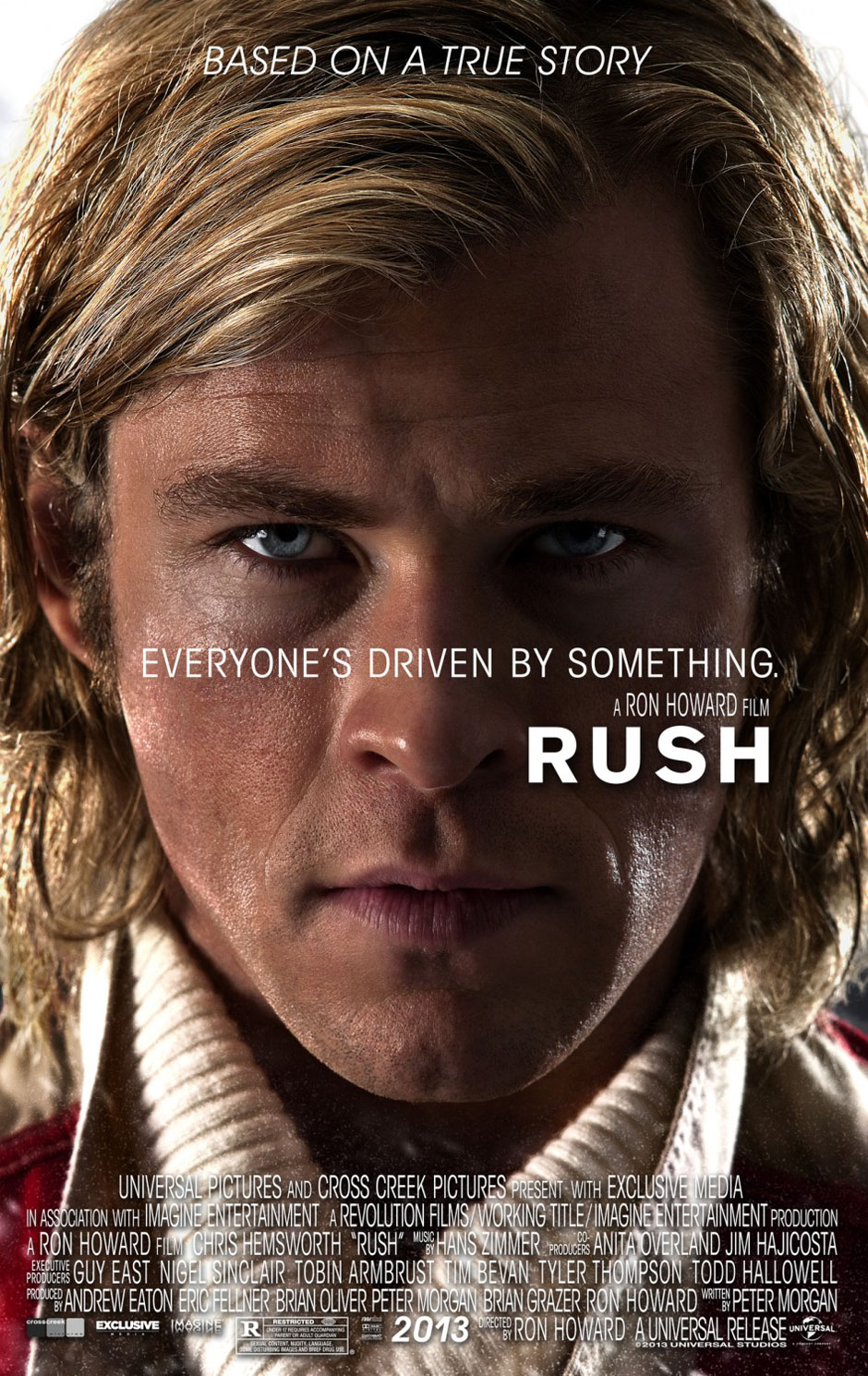Slick and sleek Formula 1 racing flashes quick and loud when director Ron Howard drives Peter Morgan’s tuned up script through a landscape of Dave Edmunds rock n’ roll, where engines zip thunderously across checkered flags. The film’s backdrop is a precarious game that kills two out of 25 adrenaline junkies every season. “Rush” follows racers James Hunt (Chris Hemsworth) and Niki Lauda (Daniel Brühl), who jockey and whirl their way through a six year rivalry, through burning Goodyear rubber and podium wisecracks. With a 1970s setting, these real events and real characters become a classic Hollywood-conceived sports formula that works primarily because it is true. The film fires off vibrant details and colorful scenes, which sometimes sideline a story that is willing to blur actuality in favor of a high-gear drama.
A FIERCE RACE CAR RIVALRY
Brash and British, playboy Hunt lives for fun and flirts with death. In his intro scene, he walks into a hospital from the racetrack shoeless and bloody. Hunt flirts with the attending nurse and explains that the accident came when another racer found out that Hunt slept with his wife. To clarify his intentions, the showman even has an embroidered patch reading “Sex, Breakfast of Champions” on his racing jacket.
In contrast, Austrian Lauda is smart and exact. He calculates that the job has a 20% risk of injury — any percentage higher, and the risk is too much. Choosing to be a racecar driver causes a falling out with his rich father. But for Lauda, happiness is the enemy. “It weakens you,” he says. “You now have something to lose.” In his book smart knowledge, he is even willing to criticize the technical weaknesses of his Ferrari sponsors while putting off fellow racers who nickname him “The Rat.”
Both Hunt and Lauda are expert drivers and “Rush” hinges on their conflict. Their relationship grows from disdain to amicable respect over six years filled with marriage, divorce, crashes and bitter banter that leads to dirty tricks and sly politics. The races happen between Hunt’s sex, drugs and binge drinking and Lauda’s pragmatic career obsession. When one wins first, the other ends second, clearly demonstrating their supremacy in the sport. The racing all builds up to the rain-soaked 1976 Japanese Grand Prix. Because of the movie’s budget, the races are far and few between. But when they start, they leave a strong impression. “Slumdog Millionaire” photographer, Anthony Dod Mantle, jacks up the film’s action with slow motion, teasing focus and suffocating close ups with hospital scenes as white-knuckling as the 170 mph racing.
NOT A TYPICAL SPORTS MOVIE
Most daring is that the film is a character piece rather than a sports movie. The entire cast, especially Hemsworth and Brühl, provide excellent performances. Each character is fuelled with enough personality to be memorable while balancing each other out within the context of the ensemble. They even manage to project enough humanity for viewers to become sympathetic.
And that’s the catch. “Rush” wants you to cheer for jerks. The problem isn’t so much that “Rush” presents Hunt and Lauda as sympathetic humans, but it is that “Rush” doesn’t show the true quality of their character, especially Hunt.
To start, Lauda and Hunt were actually friends before their “rivalry.” The film would like you to believe they were enemies from the start. Further, Hunt was reported to have slept with over 5,000 women, been in a relationship with a 15 year old, and engaged in numerous dangerous activities such as pot, cocaine and alcohol binges — all of which are, at best, only hinted at in the film. If the real Hunt were portrayed, it would have pushed a relatively typical R-rated film into NC-17 divisions. The issue is not that the film should have shown the depths of Hunt’s depravity, rather, the issue is whether the film should have heroized Hunt to begin with. He’s the fun and witty guy you’d like to meet at a party, a fact that plays into the movie’s plot. But should you root for him?
So while “Rush” goes to great lengths to provide showmanship like Hunt’s with Lauda-like precision, it has as little to say in regards to the character of Hunt and Lauda. By the end, they’ve grown much in respect towards each other but little in maturity within themselves. But so it goes with sports. We mostly praise and cheer on our favorite players and teams not for who they are, but for what they do. “Rush” — much like sports — is an exciting two-and-a-half hour thrill that stops the moment the credits roll.







